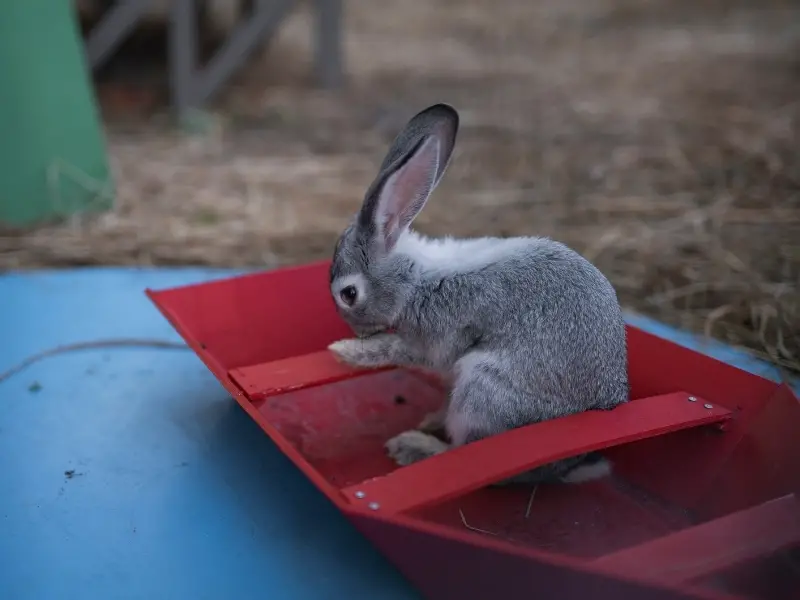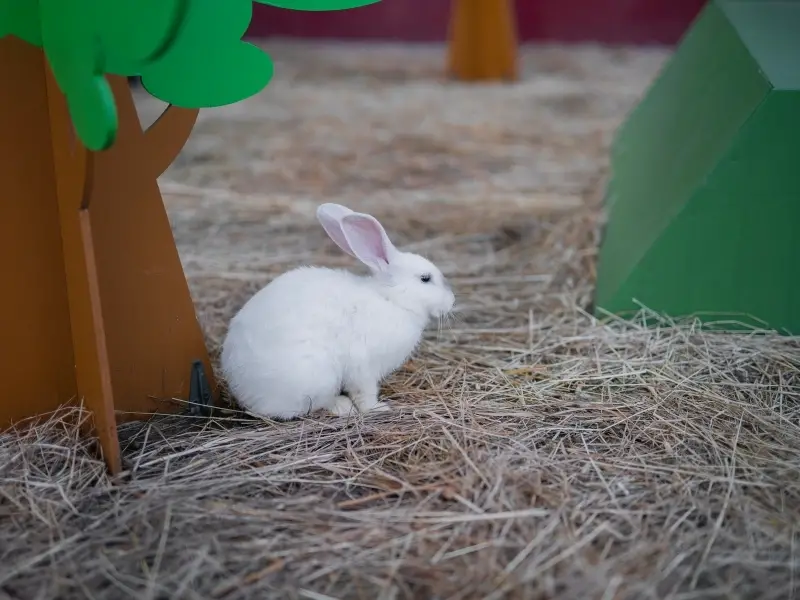Many people keep a pet rabbit. And like all other animals, rabbits also have an average lifespan. For your pet bunny to live as long as possible, it’s important to understand what factors contribute to its lifespan.
So what is a rabbit’s lifespan? Domesticated or pet rabbits live, on average, five times longer than rabbits in the wild. Thus, you can expect your pet rabbit to live between 8 and 12 years; however, smaller pet rabbit breeds live longer than larger breeds. Wild rabbits generally only live for a year or two.
Let’s dive deeper into a rabbit’s lifespan and the factors that influence how long your pet bunny will live. Plus, you’ll learn about Mick and Flopsy, two of the oldest living rabbits. Wanna guess how old Mick and Flopsy lived to be?
Rabbit History and Origin
There is a difference between wild rabbits and domesticated rabbits and their hare cousins. While we dived deeply into the differences between a hare, a bunny, and a rabbit in a previous article, there are, in fact, also differences between pet rabbits and those rabbits that live in the wild.
They are from the same family and distant relatives. Wild rabbits are Lepus sylvaticus, and Oryctolagus cuniculus, or the European rabbit or coney, are so-called indoor rabbits. These rabbit species are native to modern-day Spain and Portugal.
Monks in southern France around 600 AD are believed to have started the domestication of rabbits, and thus the differences between wild―outdoor―rabbits and pet―indoor―rabbits began.
By the 16th century, there were several different breeds of domesticated rabbits, and by the 19th century, indoor rabbits could be found all over the world. They were used for meat and fur and as beloved pets. And since the 20th century, the popularity of pet rabbits has grown drastically.
What Is a Rabbit’s Lifespan?
There is a significant difference between the lifespan of an indoor rabbit and that of an outdoor rabbit. Furthermore, different domesticated rabbit species also have different lifespans.
How Long Do Rabbits Live As Pets?
As pets, rabbits can be expected to live between 8 and 12 years. This is very dependent on how well you care for your rabbit.
Large rabbit breeds, like the Flemish giants, generally only live for 8 or 9 years. Medium-sized rabbits live a little longer, with an average life span of 10 years. Mini lops and other dwarf rabbits may live the longest at 12 years.
Here is some information about popular rabbit breeds and their average lifespan. Of course, your pet bunny can live much longer provided they are well cared for and are healthy.
- American Fuzzy Lop: 5-8 years
- American Sable: 5-8 years
- English Angora: 7-10 years
- Checkered Giant: 6-9 years
- Continental Giant: 4-7 years
- Holland Hop: 8-10 years
- Lionhead: 7-9 years
- Mini Rex: 8-10 years
- Netherland Dwarf: 7-10 years
- Standard Rex: 6-8 years
How Long Do Wild Rabbits Live?
Wild rabbits don’t live nearly as long as their indoor counterparts. On average, 15% of rabbits don’t live past the age of one, and an outdoor rabbit that lives for 2 years is a rarity.
There are various reasons why wild rabbits don’t live long:
- Weather: Extreme weather, like heat waves, strong winds, and snow, can cause rabbits to die in the wild. Like humans, they can also develop hypothermia or heat stroke.
- Disease: Illnesses and diseases for outdoor rabbits are nearly 100% fatal as these rabbits don’t get any medical care. Weak and sick rabbits are easy pickings for predators.
- Predators: Eagles and foxes and many other animals hunt and eat rabbits.
- Injury: Similar to diseases, if a rabbit is injured, there is no medical care to treat their wounds. Some wounds can be fatal, whether from the injury itself or the high risk of infection.
- Diet: Rabbits in the wild can easily ingest something that is poisonous, or they may at times not have access to enough food, leading to starvation and death.
Oldest Recorded Rabbit
The world’s oldest rabbit is Flopsy. This wild rabbit was caught in Tasmania (Australia) by L.B. Walker on August 6, 1964, and died 18 years and almost 11 months later.
The rabbit that put this Guinness World Record to the test was Mick who lived in Chicago. On February 9, 2019, Mick turned 16 years old, and sadly, he passed away a short while later.
Factors That Affect a Rabbit’s Lifespan

Let’s look at the factors that influence a pet rabbit’s lifespan:
Health
If you take care of the physical and mental health of your bunny, you are sure to increase its lifespan. If your pet rabbit gets an injury or disease, you can take it to the vet for medical care.
With regard to mental health, rabbits are social creatures and intelligent. To keep their minds stimulated and prevent them from becoming depressed, which can lead to premature death, you should invest in toys and provide socialization activities.
A spayed or neutered rabbit also lives longer, and unneutered rabbits can develop reproductive organ cancer.
Regularly take your house rabbit for health checkups so your vet can let you know when something might be wrong with your rabbit. With routine physical checks, you can prevent and address any illnesses before they become big issues.
Breed
Some rabbit breeds live longer than others. In general, small or dwarf rabbits live the longest, while large rabbits have a shorter lifespan. However, the care you provide for your rabbit has a big impact on how long they live.
Nutrition
If your rabbit is either underweight or obese, it is likely to die sooner than the average lifespan. Thus, it is important to feed your bunny a healthy and balanced diet.
Exercise
Your pet rabbit needs at least 3 hours of exercise every day. If your bunny doesn’t exercise enough, it can become overweight or develop unhealthy behaviors, like gnawing on the cage bars, which could damage its teeth.
Ensure your rabbit has enough space to run around and play.
Key Takeaways
You can increase the life expectancy of your pet rabbit. Regularly take it for checkups with the vet, ensure your rabbit gets a lot of mental stimulation. Feed your bunny a healthy diet, ensuring it is neither over nor underweight, and give it time and space to exercise.
There’s a reason undomesticated rabbits in the wild rarely reach the age of two―they don’t have you to love and take care of them.

